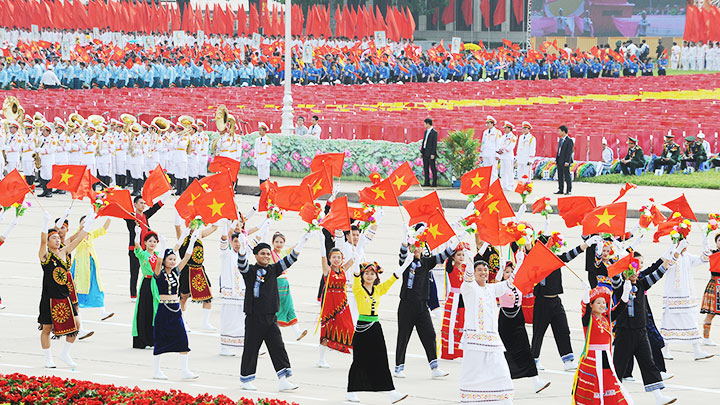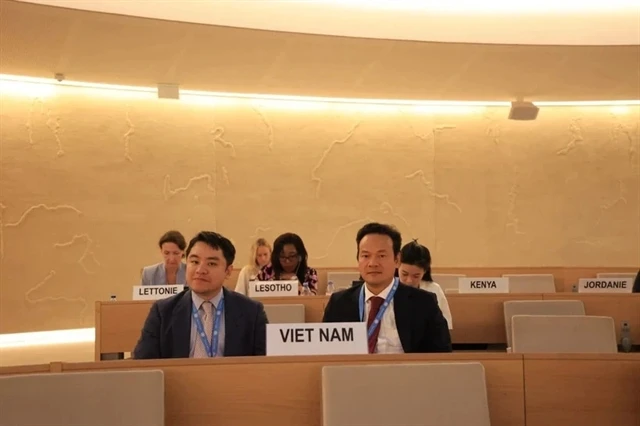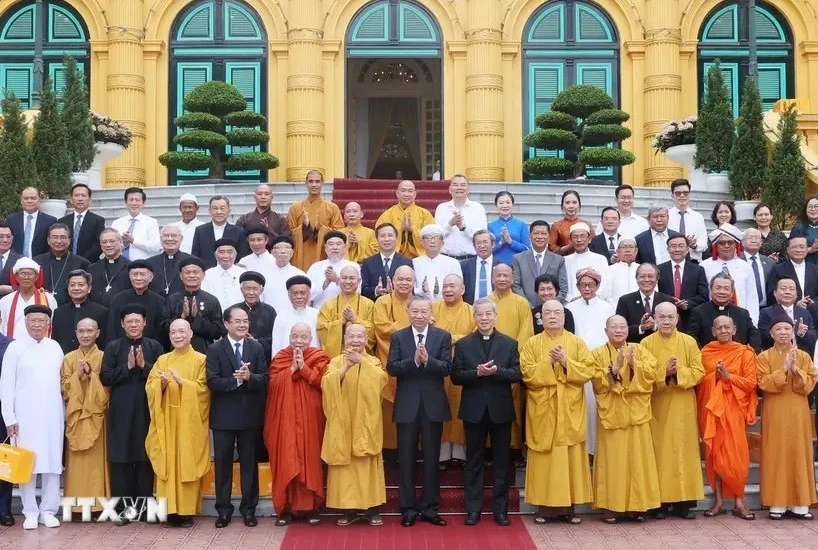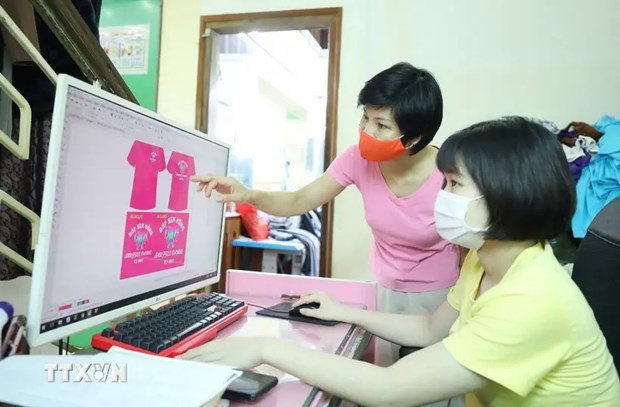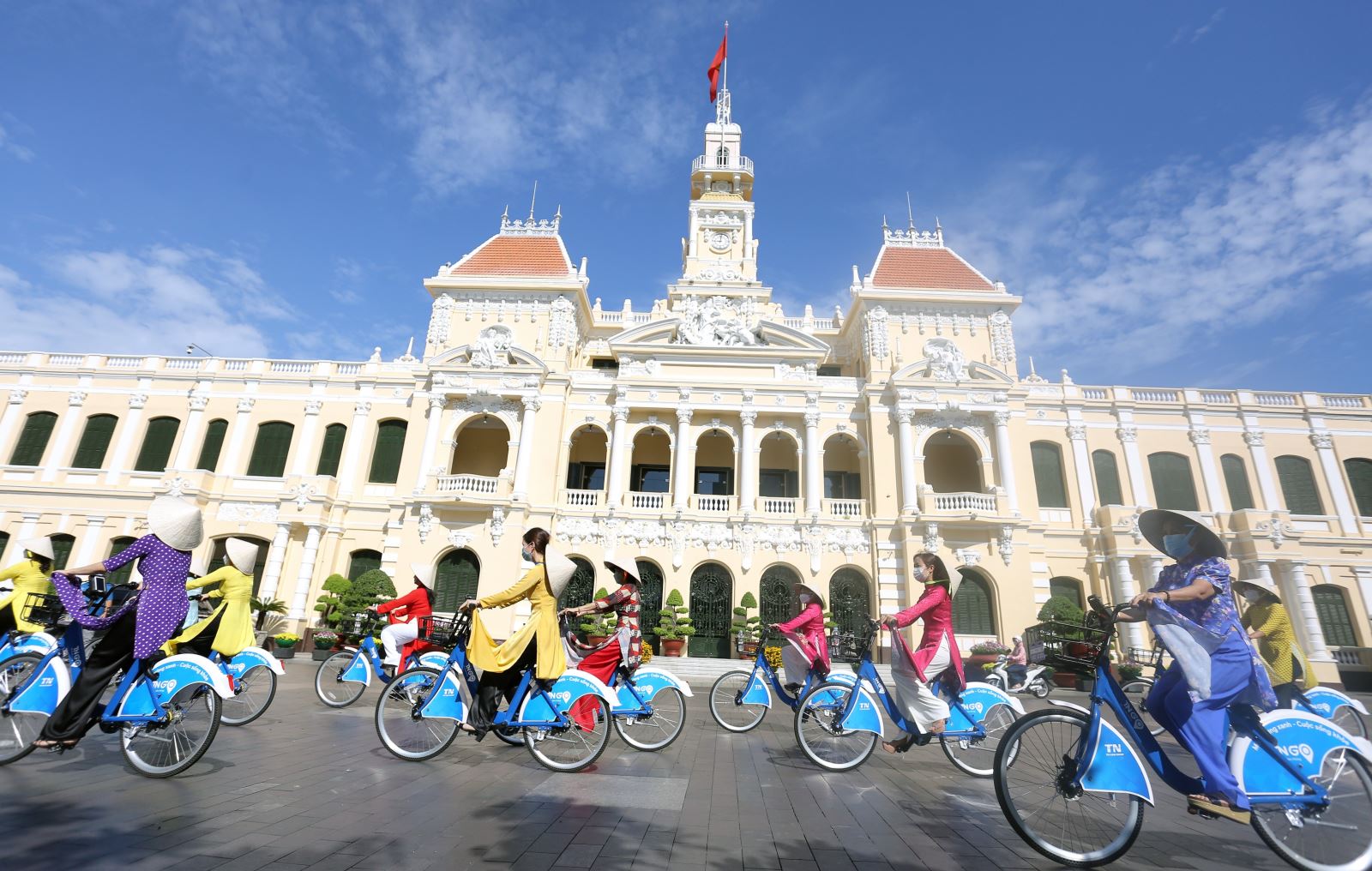
Women in Ao Dai (Vietnamese traditional long dress) participating in a parade in Ho Chi Minh City. Photo: VNA
Vietnam is entering a period where major trends such as international integration, the impact of the 4th Industrial Revolution, population aging and new social issues are affecting women and girls. These new sociocultural concerns risk exacerbating Vietnam’s existing gender issues.
These challenges require an inclusive and gender-responsive social policy system to effectively address these issues to ensure universal social security, aiming to achieve the goal of social progress and equity.
Remarkable results
In recent years, Vietnam has made many remarkable achievements in promoting gender equality and the advancement of women, which have been recognised by the international community.
According to the World Economic Forum (WEF), Vietnam ranked 72nd out of 146 countries in the Global Gender Gap Index 2023, up 11 places compared to 2022.

Vietnam has always expressed an active voice in promoting the Women, Peace and Security (WPS) Agenda. Photo: VNA
The United Nations Development Programme (UNDP) placed Vietnam in the 6th position in Southeast Asia in its Human Development Index (HDI), while Vietnam’s Gender Inequality Index was 0.296 in 2021, giving the country a ranking of 71st out of 170 countries.
Vietnam has continued to perfect policies and laws on gender equality, including the issuance of the Law on Support for Small- and Medium-sized Enterprises (2017); the National Strategy and Programme on Combating Gender-Based Violence (2021-2030); Amendments to the Law on Prevention and Control of Domestic Violence (2022); Amendments to the Labour Code (2019) and the recent National Action Plan on Women, Peace and Security.
-
 National Assembly Chairman Tran Thanh Man met with a group of full-time female lawmakers and high-ranking female officials from the NA Office and the Institute of Legislative Studies in Hanoi on October 15, ahead of the 94th founding anniversary of the Vietnam Women’s Union and Vietnamese Women’s Day (October 20). Photo: VNA
National Assembly Chairman Tran Thanh Man met with a group of full-time female lawmakers and high-ranking female officials from the NA Office and the Institute of Legislative Studies in Hanoi on October 15, ahead of the 94th founding anniversary of the Vietnam Women’s Union and Vietnamese Women’s Day (October 20). Photo: VNA
At the international level, Vietnam has always expressed an active voice in promoting the Women, Peace and Security (WPS) Agenda, notably leading the adoption of the UN Security Council’s Resolution 1889 and prompting the adoption of the 2020 Hanoi Commitment to Action co-sponsored by 75 countries.
Vietnam has one of the highest rates of women’s political participation in the world. According to a report by the Vietnam Women’s Union, the rate of female members of Party committees at all three levels nationwide for the 2020-2025 tenure has increased compared to the previous term, exceeding the target of 15%. Meanwhile, the rate of female deputies to the 15th National Assembly reaches 30.26%, the highest since the 6th National Assembly. Women leaders and managers in ministries, central and local agencies in 2023 was higher compared to 2022.

Female delegates make up a large proportion of the 15th National Assembly’s 7th session. (Photo: VNA)
Striving to ensure and further promote gender equality, on January 25, 2024, Deputy Prime Minister Tran Luu Quang signed Decision No. 101/QD-TTg approving the National Action Programme on WPS for the 2024-2030 period.
The action programme has four major objectives – increasing women’s participation, better responding to gender-based violence, strengthening gender mainstreaming in relief and recovery work, and strengthening international cooperation.
The programme serves as an important policy orientation, affirming Vietnam’s determination and commitment to ensuring and further promoting the role and voice of women.
Promoting gender equality in social aspects
As part of the workforce, women have shown their increasingly important participation and position in the economy and the country’s economic growth and implementation of sustainable development goals.

Prime Minister Pham Minh Chinh meets with outstanding female entrepreneurs (Photo: VNA)
However, the country has still faced a number of social issues related to women and gender equality. Although the 2019 Labour Code has been amended, there are still shortcomings in regulations and policies regarding female workers.
Meanwhile, gender stereotypes about the status and role of women, along with the burden of housework and family care, are still factors that prevent women from engaging in poverty reduction policies and programmes.
 Women have actively participated in socio-economic activities, and beared the burden of housework at the same time. Photo: VNA
Women have actively participated in socio-economic activities, and beared the burden of housework at the same time. Photo: VNA
Besides, women’s access to basic social services has yet to receive due attention, the same as for vocational training for disadvantaged groups, ethnic minorities, and women. Legal regulations in the health sector impact women and children’s access to healthcare services.

Together with the adoption of new experiences and achievements in institutionalising international commitments on women’s empowerment and promoting gender equality, aiming at promoting social progress and justice and building a system of inclusive and gender-responsive social policies, experts have pointed to a number of issues that the country should focus on.

Firstly, it is necessary to design more policies and programmes to support job creation for workers, they said, urging the country to modernise the labour supply-demand connection, bettering labour market forecasting and human resources management, and building a gender-disaggregated labour and employment database.
Secondly, the country should renovate the approach to gender mainstreaming in poverty reduction programmes and policies, while specifying mechanisms and regulations, including allocating adequate budget and resources to efforts for gender mainstreaming in practice.
Thirdly, it is crucial to develop a flexible and diverse social insurance system, focusing on amending and supplementing voluntary social insurance policies based on the principle of ensuring gender equality to encourage female workers to participate.
Fourthly, the country needs to perfect the system of policies and laws on social assistance, they said, emphasising the necessity to develop and diversify social assistance services, build a flexible social support system, adapt to possible risks, with special attention to women.
Fifthly, they stressed the need to provide a number of basic social services for the people to ensure that vulnerable groups, including women, are protected.
Sixthly, the experts advised Vietnam to continue to step up communications to raise public awareness of gender equality, while promoting information technology application to disseminate gender equality among people from all walks of life./.

The rate of Vietnamese female officers participating in UN peacekeeping operations is higher than the general rate and the UN’s target. Photo: VNA
Source: VNA

